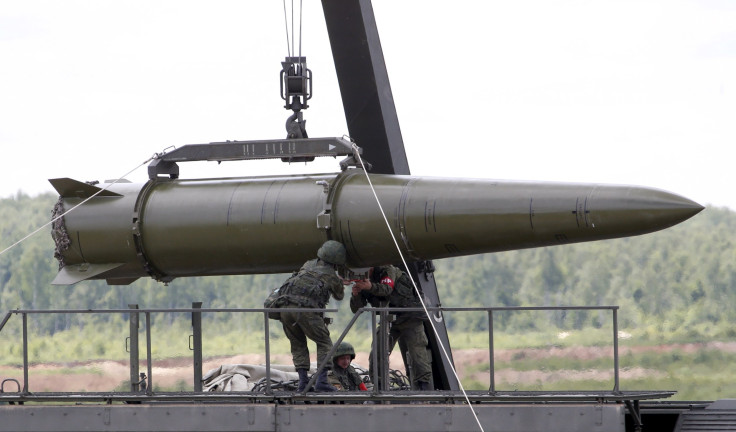Russia Could Use Tactical Nukes, Warns Top Ukraine General; What Are They And Why The World Fears Them
KEY POINTS
- Russia's military resources are running low as Ukraine counter-attacks
- Russia has nearly 2,000 tactical nuclear weapons
- Theoretically the fallout from such nuclear blasts are limited
- Russian President Putin has defied western calculations many times
The West has convinced itself that Russia will not use nuclear weapons, provided the war is limited to Ukraine. But Russian President Vladimir Putin has repeatedly defied such assessments based on logic and common sense, including when he sent in troops to Ukraine and shut down gas to Europe. Reverses in the battlefield could make that unpredictability terribly dangerous for the whole world and very quickly.
Ukraine' top general has now made the grim warning that Russia could use tactical nuclear weapons, which would create the risk of a "limited" nuclear conflict with other powers.
"There is a direct threat of the use, under certain circumstances, of tactical nuclear weapons by the Russian Armed forces," Gen. Valeriy Zaluzhnyi in a co-authored article published by state news agency Ukrinform.
"It is also impossible to completely rule out the possibility of the direct involvement of the world's leading countries in a 'limited' nuclear conflict, in which the prospect of World War Three is already directly visible," he pointed out.
Since the beginning of the war, the U.S. and its NATO allies have avoided triggering a nuclear confrontation with Russia and hence been firm in not allowing Ukraine to use Western-supplied weapons to hit targets inside Russian territory. But they have increasingly loosened the restrictions on the type and quantify of offensive weapons that have been flowing into Ukraine.
Whereas Ukraine continues to receive billions of dollars worth of sophisticated western weapons, Russia has been forced to rely on its own resources which are now running low. A desperate Moscow is now shopping in friendly capitals for weapons.
Given his depleting military resources, the fear is that Putin will sooner or later be forced to dip into Russia's tactical nuclear arsenal to achieve victory or at least freeze the conflict.
Less powerful than strategic nuclear weapons, tactical nuclear weapons can be used in a specific area such as a battlefield, without widespread destruction and limited radioactive fallout -- at least theoretically. The Russian tactical nukes are believed to be in the 10-kiloton range or below; the Hiroshima bomb was around 15 kilotons. Some U.S. tactical nuclear weapons yield around 100-kilotons.
Experts say because tactical nuclear weapons have a lower yield and are considered more "useable," they can create ambiguity and confusion on the battlefield, increasing the risk of a nuclear war.
Russia is said to have nearly 2,000 tactical nuclear weapons that can be placed on any conventional weapon system or fired as artillery shells from air, ship or land. Russia has deployed several of these conventional weapon systems, such as its Iskander ballistic missile, that can also be used to carry these tactical nukes.
Vladimir Putin gave orders to increase the alert level of his country's nuclear forces and made veiled nuclear threats in what was believed as a deterrence against NATO involvement in the war when his troops invaded Ukraine on Feb. 24. Russia has termed the operation a "special military operation." Belarus, a Russian ally, also reaffirmed its offer to host Russian tactical nuclear weapons on its territory.
This is not the first time that Putin has waved the nuclear threat. In 2014, he did so during Russia's invasion of Crimea with Russian leaders speaking about putting nuclear weapons on alert. Then, a year later in 2015, Russia threatened Danish warships with nuclear weapons if Denmark joined NATO's missile defense system.
Although professed military doctrines don't mean much when nations are at war, it is important to point out what Moscow says about the use of nuclear weapons. Russian military doctrine says the country reserves the "right to use nuclear weapons in response to the use of nuclear and other types of weapons of mass destruction against it" as well as "in the event of aggression against" the country even with the "use of conventional weapons when the very existence of the state is in jeopardy."
Ukraine has all along refused to publicly acknowledge any direct involvement in attacks carried out in Russian territory. However, Gen. Zaluzhnyi has acknowledged for the first time that Ukraine was responsible for a series of strikes on Russian air bases in Crimea. Annexed in 2014, Russia considered Crimea to be its territory.
The West's push to defeat Russia, as spelled out explicitly by several western leaders, is based on cold calculations — which don't take into account the unpredictability of the Russian response. And that is a danger that Gen. Zaluzhnyi seems to be recognizing.

© Copyright IBTimes 2025. All rights reserved.






















